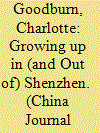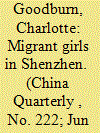|
|
|
Sort Order |
|
|
|
Items / Page
|
|
|
|
|
|
|
| Srl | Item |
| 1 |
ID:
171087


|
|
|
|
|
| Summary/Abstract |
Extensive research has shown that rural-to-urban migrant children in China face significant barriers to an urban public primary school education and often end up in poor-quality, migrant-run private schools. However, much less is known about what happens after children leave junior high school. This article therefore draws on two rounds of interviews with migrant children educated in Shenzhen, in 2008–9 and then in 2015–16, to examine in detail their experiences of schooling and labor-market entry. It identifies four distinct pathways of education—state vocational school, private migrant secondary school, state academic high school, and return to the countryside for further schooling—and suggests that these educational routes all ultimately lead to the same endpoint: regardless of pathway, aptitude, financial investment in education, and earlier career aspirations, migrant youths are channeled into low-skilled urban service work. This is in marked contrast to the hopes of parents that their children will achieve upward mobility through investment in education. This article analyzes the multiple reasons for the depressing uniformity of outcomes and the crucial role of state policy at both the central and local levels in perpetuating migrant disadvantage.
|
|
|
|
|
|
|
|
|
|
|
|
|
|
|
|
| 2 |
ID:
139555


|
|
|
|
|
| Summary/Abstract |
This paper examines the impact of rural–urban migration on primary school-age migrant girls in China, providing important data on this unexplored group as well as drawing several larger conclusions about the evolving relationship between migration and women's autonomy. Much recent literature has focused on Chinese young unmarried women migrants. However, there has been no attempt to distinguish the effect of migration on children by gender, and little research on the “new generation” of married women migrants. This paper focuses on two aspects of migrant girls' well-being, education and migration satisfaction, and compares girls' assessments with those of their parents, particularly their mothers. It analyses differences between the views of both girls and parents, arguing that specific parental concerns about daughters shape girls' futures in ways that do not apply to migrant boys. A further, broader, implication of this analysis is that certain benefits of migration, previously thought to apply exclusively to single women, extend also to married women, influencing mothers when forming goals for their daughters' futures.
|
|
|
|
|
|
|
|
|
|
|
|
|
|
|
|
| 3 |
ID:
173256


|
|
|
|
|
| Summary/Abstract |
This article draws on analysis of local policy documents and migrant and official interviews to explore the development, implementation and impacts of two aspects of China’s 2014 hukou reforms that have been less scrutinised than the abolition of the rural/urban distinction: the mandatory use of residence permits and points systems for migrants to cities with a population over 5 million. Taking migrant education as a case study, and focusing on Shanghai, Shenzhen, and Beijing, it argues that central and local priorities are more about population control than social equality. Far from their stated aims of equalizing migrant services with locals, the policies introduce new forms of educational and social stratification, aimed at increasing control over migrant selectivity, with far-reaching consequences for Chinese social development.
|
|
|
|
|
|
|
|
|
|
|
|
|
|
|
|
|
|
|
|
|